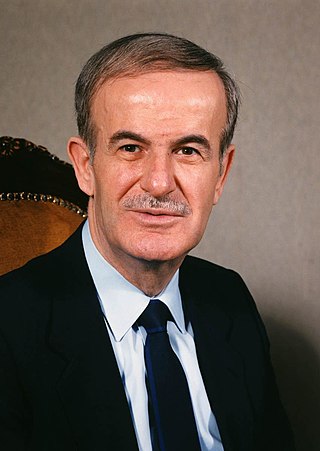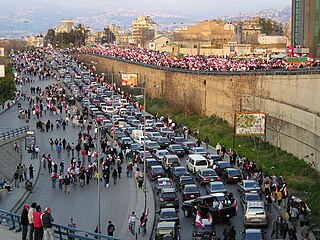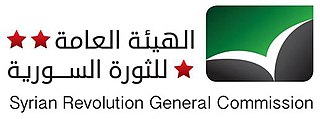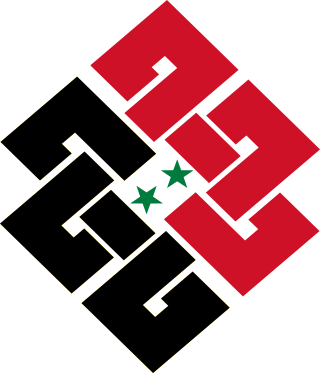
Hafez al-Assad was a Syrian politician and military officer who served as the 18th president of Syria from 1971 until his death in 2000. He had previously served as prime minister of Syria from 1970 to 1971 as well as regional secretary of the regional command of the Syrian regional branch of the Arab Socialist Ba'ath Party and secretary general of the National Command of the Ba'ath Party from 1970 to 2000. Hafez al-Assad was a key participant in the 1963 Syrian coup d'état, which brought the Syrian regional branch of the Arab Socialist Ba'ath Party to power in the country, a power that lasted until the fall of the regime in 2024, then led by his son Bashar.

The Cedar Revolution, also known as the Independence uprising, was a chain of demonstrations in Lebanon triggered by the assassination of former Lebanese Prime Minister Rafic Hariri. The popular movement was remarkable for its avoidance of violence, peaceful approach, and its total reliance on methods of civil resistance.

The Muslim Brotherhood in Syria is a Syrian branch of the Sunni Islamist Muslim Brotherhood organization. Its objective is the transformation of Syria into an Islamic state governed by Sharia law through a gradual legal and political process.

Rifaat Ali al-Assad, known as the 'Butcher of Hama', is a Syrian former military officer and politician. He is the younger brother of the late President of Syria, Hafez al-Assad, and Jamil al-Assad, and the uncle of the former President Bashar al-Assad. He was the commanding officer of the ground operations of the 1982 Hama massacre ordered by his brother.
The National Democratic Rally or National Democratic Gathering is a banned opposition alliance in Syria, comprising five political parties of a secularist, pan-Arabist, Arab nationalist and socialist bent.

Bushra al-Assad is the first child and only daughter of Hafez al-Assad, who was the president of Syria from 1971 to 2000. She is the sister of former Syrian President Bashar al-Assad. She is the widow of Assef Shawkat, the deputy chief of staff of the Syrian Armed Forces and former head of the Syrian Military Intelligence, who was killed in the 18 July 2012 explosion in Damascus claimed by a coalition of Syrian opposition rebel groups.
The 1999 Latakia protests were violent protests and armed clashes, which erupted in Latakia, Syria following 1998 People's Assembly's Elections. The violent events were an explosion of a long-running feud between Hafez al-Assad and his younger brother Rifaat. Two people were killed in fire exchanges of Syrian police and Rifaat's supporters during police crack-down on Rifaat's port compound in Latakia. According to opposition sources, denied by the government, the protests left hundreds of dead or injured.

The Syrian National Council, sometimes known as the Syrian National Transitional Council or the National Council of Syria, is a Syrian opposition coalition, based in Istanbul, Turkey, formed in August 2011 during the Syrian civil uprising against the government of Bashar al-Assad.

Syrian Revolution General Commission (SRGC) (Arabic: الهيئة العامة للثورة السورية) is a Syrian coalition of 40 Syrian opposition groups to unite their efforts during the Syrian civil war that was announced on 19 August 2011 in Istanbul, Turkey.

The National Coordination Committee for Democratic Change (NCC), or National Coordination Body for Democratic Change (NCB), is a Syrian bloc chaired by Hassan Abdel Azim consisting of 13 left-wing political parties and "independent political and youth activists". It has been defined by Reuters as the internal opposition's main umbrella group. The NCC initially had several Kurdish political parties as members, but all except for the Democratic Union Party left in October 2011 to join the Kurdish National Council. Some opposition activists have accused the NCC of being a front organization for Bashar al-Assad's government and some of its members of being ex-government insiders.

The Syrian opposition, also known as the Syrian revolutionaries is an umbrella term for the groups that opposed the Assad regime in Syria. In July 2011, at the beginning of the Syrian civil war, defectors from the Syrian Arab Armed Forces formed the Free Syrian Army, a name that was later used by several armed factions during the conflict. In August 2011, political groups operating from abroad formed a coalition called the Syrian National Council. A broader organization, the Syrian National Coalition (SNC), was formed in November 2012. In turn, the Coalition formed the Syrian Interim Government (SIG) which operated first as a government-in-exile and, from 2015, in certain zones of Syria. From 2016, the SIG was present in Turkish-occupied zones while the SNC operated from Istanbul. In 2017, the Islamist group Tahrir al-Sham (HTS), unaffiliated to the SNC, formed the Syrian Salvation Government (SSG) in the areas it controlled. Rebel armed forces during the civil war have included the Turkish-backed Syrian National Army, affiliated to the SIG, the Syrian Liberation Front, the National Front for Liberation, the Southern Operations Room and the Revolutionary Commando Army. Other groups that challenged Bashar al-Assad's rule during the civil war were the Autonomous Administration of North and East Syria, and the jihadist organization known as the Islamic State.

The Popular Front for Change and Liberation is a coalition of Syrian political parties. It briefly participated as the leader of the official political opposition within the People's Council of Syria, the state's unicameral parliament. Following Assad regime's decision to conduct the 2016 parliamentary elections during the Geneva talks, the front withdrew its participation.
Supreme Council of the Syrian Revolution (SCSR) is a Syrian opposition group supporting the overthrow of the Bashar al-Assad government in Syria during the Syrian civil war. It grants local opposition groups representation in its national organisation.

George Sabra is a Syrian politician and member of the Syrian Democratic People's Party. He was elected president of the Syrian National Council, the main opposition group in Syria, on 9 November 2012 and later was acting president of the National Coalition for Syrian Revolutionary and Opposition Forces from 22 April – 6 July 2013. He resigned from the National Coalition on 25 April 2018. Sabra is a Christian.

The National Coalition of Syrian Revolution and Opposition Forces, commonly named the Syrian National Coalition (SNC), or the Syrian National Revolutionary Coalition (SNRC) is a political organization founded in Doha, Qatar, in November 2012 during the Syrian Civil War in an attempt to coalesce the various movements opposed to Bashar al-Assad's Ba'athist regime. Former imam of the Umayyad Mosque in Damascus, Moaz al-Khatib, considered a moderate, was elected the president of the coalition, and resigned on 21 April 2013. Riad Seif and Suheir Atassi, both prominent democracy activists and the latter a secular human rights advocate, were elected vice presidents. The post of a third vice president will remain vacant for a Kurdish figure to be elected. Mustafa Sabbagh was elected as the coalition's secretary-general. The coalition has a council of 114 seats, though not all of them are filled.
A number of states and armed groups have involved themselves in the Syrian civil war (2011–present) as belligerents. The main groups were the Syrian Arab Republic and allies, the Syrian opposition and allies, Al-Qaeda and affiliates, Islamic State, and the Kurdish Syrian Democratic Forces.
The Syrian opposition is the political structure of the Syrian National Coalition and associated groups opposing the Syrian government.

The Shahba Canton was a political unit of the Autonomous Administration of North and East Syria, in the Aleppo Governorate. The canton was established to administer the areas captured by the Syrian Democratic Forces from the Islamic State of Iraq and the Levant west of the Euphrates, as part of the Afrin Region.

The High Negotiations Committee (HNC) is an umbrella body which was created to represent the Syrian opposition in the planned Geneva peace talks in 2016. It is led by Riyad Farid Hijab, who was Prime Minister of Syria from June to August 2012. It is considered to be Syria's main or broadest opposition bloc.
Anarchism in Syria emerged as a largely disorganized movement during the authoritarian rule of the Assad government, but following the initiation of the Arab Spring has been a particularly notable factor in the Rojava conflict during the civil uprising phase of the Syrian civil war.












